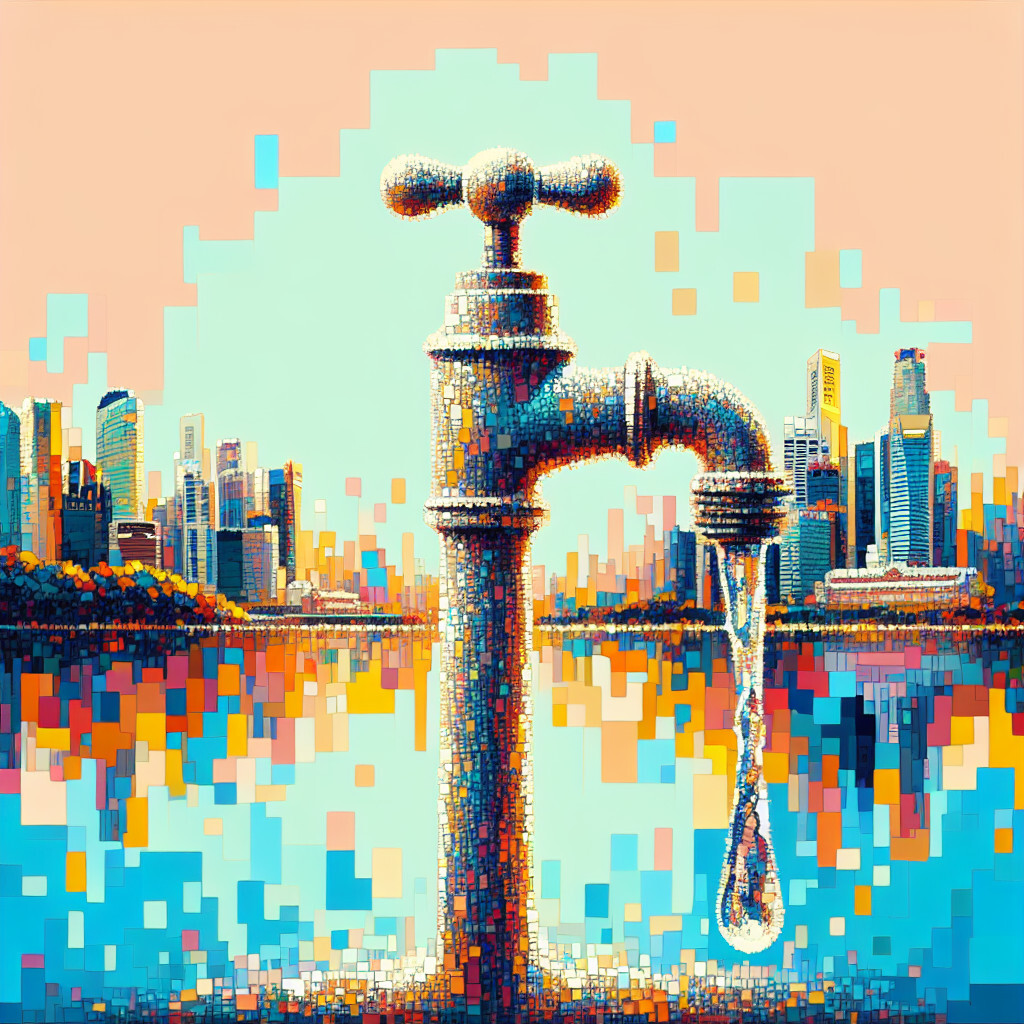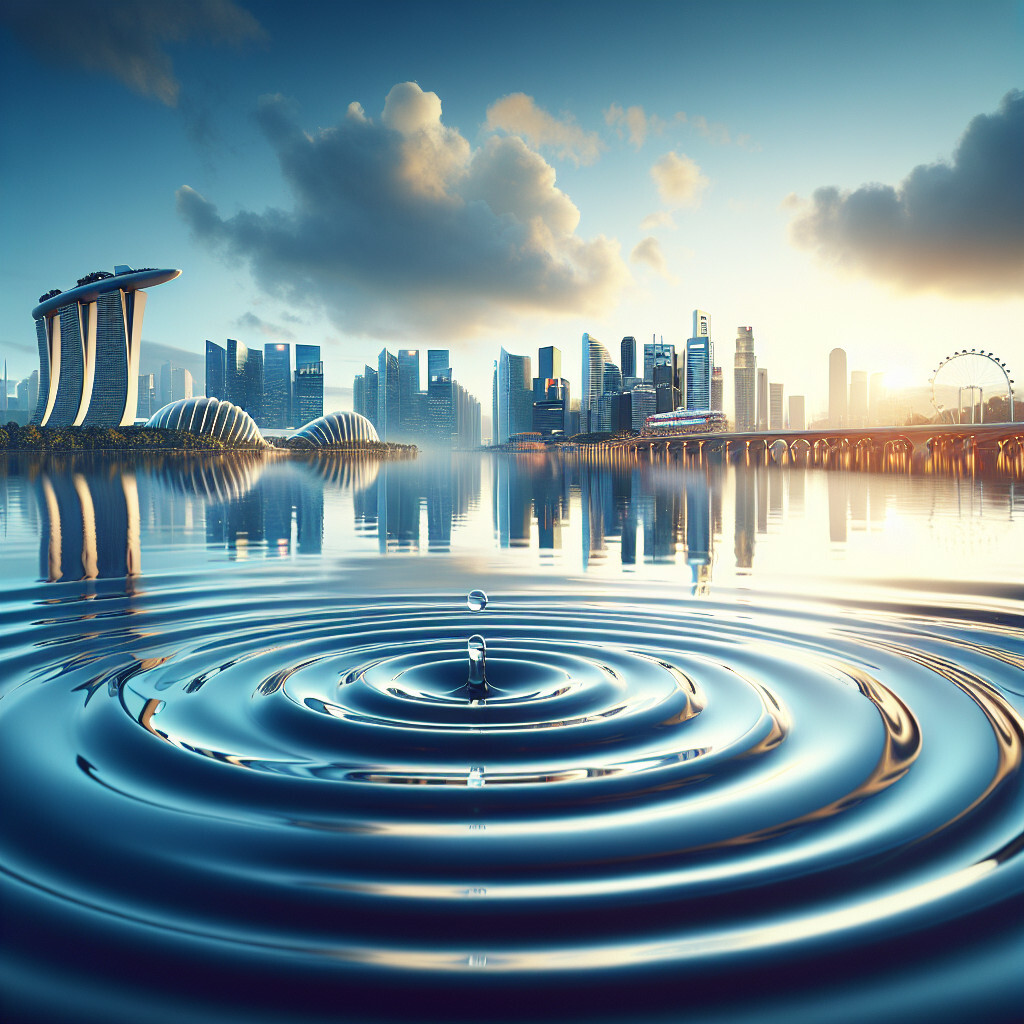-
Table of Contents
“Singapore’s Tap Water: Clean, Safe, and Ready to Drink!”
Introduction

The tap water in Singapore is safe to drink and of high quality, meeting the guidelines of the World Health Organization. It is processed through advanced filtration and purification methods, including reverse osmosis and ultraviolet disinfection, ensuring it is clean and safe for consumption. The water is regularly tested for its quality and safety by the Public Utilities Board (PUB), Singapore’s national water agency. Despite this, some residents prefer to boil or filter the tap water before drinking, as a matter of personal preference.
Understanding the Quality of Tap Water in Singapore
Singapore, a bustling city-state located in Southeast Asia, is renowned for its high standard of living, technological advancements, and impressive infrastructure. One of the key aspects that contribute to this reputation is the quality of its tap water. Singapore’s tap water is acclaimed globally for its superior quality and safety, making it one of the few countries in the world where tap water is safe to drink directly from the tap without any further filtration or boiling.
The Public Utilities Board (PUB), Singapore’s national water agency, is responsible for ensuring the quality and safety of the country’s tap water. The PUB adheres to stringent standards set by the World Health Organization (WHO) and conducts regular checks to ensure that the water quality remains uncompromised. The water is tested for over 300 parameters, far exceeding the 100 parameters set by the WHO. This rigorous testing ensures that the tap water in Singapore is not only safe for consumption but also of high quality.
The tap water in Singapore comes from four different sources, known as the ‘Four National Taps’. These include local catchment water, imported water, high-grade reclaimed water known as NEWater, and desalinated water. Each source undergoes a different treatment process before it is deemed safe for consumption. Local catchment water, for instance, is treated at water treatment plants where it undergoes several processes such as coagulation, sedimentation, filtration, and disinfection. Imported water, on the other hand, is treated and tested for quality before it is supplied to households.
The NEWater, a significant component of Singapore’s water supply, is treated using advanced membrane technologies and ultra-violet disinfection, making it ultra-clean and safe to drink. The desalinated water, which is seawater converted into drinking water, undergoes a process of pre-treatment, reverse osmosis, and post-treatment to ensure its safety and quality.
Despite the high quality of tap water, some Singaporeans prefer to boil or filter their water before drinking. This is largely due to cultural habits and personal preferences rather than any actual need for additional purification. The PUB assures that the tap water is safe to drink straight from the tap and there is no need for further filtration or boiling.
However, it is important to note that while the water supplied by PUB is of high quality, the condition of the water can be affected by the internal plumbing of individual households. Factors such as rusty pipes or unclean water tanks can contaminate the water. Therefore, it is recommended to regularly maintain and check the condition of the internal plumbing to ensure the quality of the tap water.
In conclusion, the tap water in Singapore is of high quality and safe to drink directly from the tap. This is a testament to the country’s commitment to providing its residents with the best possible resources and services. The rigorous testing and treatment processes, coupled with regular maintenance and checks, ensure that Singaporeans have access to clean and safe drinking water at all times. This, in turn, contributes to the overall health and well-being of the population, reinforcing Singapore’s reputation as a city-state that prioritizes the welfare of its residents.
The Process Behind Singapore’s Clean Tap Water
Singapore, a bustling city-state known for its impressive skyline and vibrant culture, is also renowned for its high-quality tap water. The tap water in Singapore is perfectly safe to drink, thanks to the country’s rigorous water treatment processes and stringent quality control measures. This article will delve into the process behind Singapore’s clean tap water, providing an informative and formal exploration of the topic.
Singapore’s water supply primarily comes from four sources: local catchment water, imported water, desalinated water, and NEWater. Local catchment water refers to rainwater that is collected in reservoirs and water bodies across the island. Imported water is sourced from neighbouring Malaysia under long-term agreements. Desalinated water is obtained by removing salt and other impurities from seawater, while NEWater is high-grade reclaimed water produced from treated used water that is further purified using advanced membrane technologies.
The process of treating water in Singapore is meticulous and thorough. For local catchment water, the process begins with the collection of rainwater in reservoirs. The water is then sent to water treatment plants where it undergoes a series of treatments. These include coagulation and flocculation, where chemicals are added to the water to remove suspended particles, followed by sedimentation, filtration, and disinfection to eliminate any remaining impurities and harmful microorganisms.
Imported water undergoes a similar treatment process. However, the water is first stored in local reservoirs before being sent to the treatment plants. Desalinated water, on the other hand, is processed through reverse osmosis, where seawater is forced through semi-permeable membranes to remove salts and other impurities. The water is then disinfected and stabilised before being distributed to the public.
NEWater, Singapore’s own brand of reclaimed water, is produced through a three-step process. The first step involves microfiltration or ultrafiltration to remove suspended solids, colloidal particles, and disease-causing organisms. The second step is reverse osmosis, which removes dissolved salts, viruses, and pharmaceuticals. The final step is ultraviolet disinfection to ensure that the water is free from any remaining microorganisms. The result is ultra-clean, high-grade reclaimed water that is safe for drinking and industrial use.
Quality control is a crucial aspect of Singapore’s water treatment process. The Public Utilities Board (PUB), Singapore’s national water agency, conducts over 400,000 water quality tests annually on more than 300 parameters. This rigorous testing ensures that the tap water in Singapore meets the World Health Organization’s guidelines for drinking water quality.
In addition to the PUB’s efforts, the Singapore government also encourages households to install water filters for added assurance. However, these filters are not necessary for health reasons as the tap water is already safe to drink. They are recommended mainly for aesthetic reasons, such as improving the taste or removing any residual chlorine smell.
In conclusion, the tap water in Singapore is a testament to the country’s commitment to public health and sustainability. Through innovative water treatment processes and stringent quality control measures, Singapore has ensured that its tap water is not only safe to drink but also contributes to the long-term water sustainability of the nation. The next time you turn on the tap in Singapore, you can be assured that a lot of thought, effort, and technology has gone into delivering that clean, safe water.
Health Implications of Drinking Tap Water in Singapore
Singapore, a bustling city-state known for its high standard of living and technological advancements, has also earned a reputation for its exceptional water quality. The tap water in Singapore is not only safe for consumption but also meets the World Health Organization’s guidelines for drinking water quality. This article will delve into the health implications of drinking tap water in Singapore, providing a comprehensive understanding of its safety and benefits.
The Public Utilities Board (PUB), Singapore’s national water agency, is responsible for ensuring the safety and quality of the country’s tap water. The PUB conducts rigorous and regular checks on the water supply, testing for over 300 parameters, which is more than what the World Health Organization requires. This stringent process ensures that the tap water in Singapore is free from harmful bacteria, viruses, and chemicals, making it safe for direct consumption.
One of the significant health benefits of drinking tap water in Singapore is its fluoridation. Since 1958, Singapore has been adding fluoride to its water supply, a practice endorsed by the World Health Organization. Fluoridation of water is known to prevent tooth decay, a common health issue worldwide. By drinking fluoridated tap water, residents can maintain good oral health, reducing the risk of dental cavities.
Moreover, tap water in Singapore is also treated using advanced membrane filtration, ultraviolet disinfection, and reverse osmosis technology. These processes remove microscopic impurities and potential disease-causing organisms, ensuring the water is clean and safe to drink. This high level of purification not only guarantees the safety of the water but also contributes to the overall health of the population by preventing waterborne diseases.
However, despite the high quality of tap water, some Singaporeans prefer to boil their water before drinking. This practice is more of a cultural habit than a necessity, as the PUB assures that tap water is safe for direct consumption. Boiling water can further ensure its safety, especially for those with compromised immune systems, but it is not a requirement in Singapore.
While the tap water in Singapore is safe to drink, it is essential to maintain the cleanliness of water dispensers and containers to prevent bacterial growth. Regular cleaning and maintenance of these items are necessary to ensure that the quality of the water is not compromised.
In conclusion, the tap water in Singapore is of high quality and safe for consumption. The rigorous testing and treatment processes it undergoes ensure it is free from harmful substances, providing a reliable source of hydration for the population. The addition of fluoride also offers the added benefit of promoting oral health. While some residents may choose to boil their water, this is not a necessity given the high safety standards of the water supply. However, maintaining the cleanliness of water dispensers and containers is crucial to preserving the quality of the water. Therefore, residents and visitors alike can confidently consume tap water in Singapore, knowing it meets international standards and contributes to their overall health.
Comparing Singapore’s Tap Water to Other Countries
Singapore, a bustling city-state located in Southeast Asia, is renowned for its impressive skyline, multicultural society, and high standard of living. One aspect of Singapore’s infrastructure that often goes unnoticed, yet plays a crucial role in maintaining the city’s high quality of life, is its tap water. Singapore’s tap water is not only safe to drink but is also considered one of the cleanest in the world. This article aims to compare the quality of Singapore’s tap water to that of other countries.
Singapore’s tap water is treated using advanced membrane technologies and is subjected to rigorous testing to ensure its safety and quality. The Public Utilities Board (PUB), Singapore’s national water agency, conducts over 400,000 water quality tests annually on more than 300 parameters. This is far more comprehensive than the World Health Organization’s guidelines, which recommend testing for only 100 parameters.
In contrast, tap water in many other countries, including some developed nations, may not be safe to drink directly from the tap. For instance, in the United States, tap water quality can vary significantly from one region to another due to differences in water sources and treatment methods. While most American cities have safe tap water, there have been instances of water contamination, such as the Flint water crisis in Michigan.
Similarly, in many parts of Europe, while tap water is generally safe to drink, there are exceptions. For example, in some Eastern European countries, tap water may contain high levels of certain contaminants due to inadequate water treatment facilities.
In developing countries, the situation is often more dire. In many parts of Africa, Asia, and South America, access to clean, safe drinking water is a major challenge. In these regions, tap water is often contaminated with harmful bacteria, viruses, and parasites, making it unsafe to drink without proper treatment.
Singapore’s tap water, on the other hand, is consistently safe to drink. This is due to the country’s stringent water treatment processes, which include coagulation and flocculation, sedimentation, filtration, and disinfection. Furthermore, Singapore has also invested heavily in advanced water treatment technologies, such as reverse osmosis and ultraviolet disinfection, to ensure the highest possible water quality.
Another factor contributing to Singapore’s superior tap water quality is its innovative approach to water management. Singapore has developed a diversified water supply strategy known as the “Four National Taps,” which includes local catchment water, imported water, high-grade reclaimed water known as NEWater, and desalinated water. This strategy ensures a stable and sustainable water supply, even in the face of climate change and population growth.
In conclusion, Singapore’s tap water stands out as one of the cleanest and safest in the world, thanks to the country’s rigorous water treatment processes, advanced technologies, and innovative water management strategies. While tap water quality can vary significantly in other countries, Singapore’s tap water is consistently safe to drink, making it a model for other nations to emulate.
Q&A
1. Question: Is tap water in Singapore safe to drink?
Answer: Yes, tap water in Singapore is safe to drink. It meets the World Health Organization’s guidelines for drinking water quality.
2. Question: How is the quality of tap water in Singapore maintained?
Answer: The quality of tap water in Singapore is maintained through a rigorous process of treatment, regular testing, and monitoring by the Public Utilities Board (PUB).
3. Question: What is the taste of tap water in Singapore?
Answer: The taste of tap water in Singapore is generally neutral and clean, as it is thoroughly treated and purified.
4. Question: Does Singapore’s tap water contain any harmful substances?
Answer: No, Singapore’s tap water does not contain any harmful substances. It is treated and tested to ensure it is free from harmful bacteria and viruses.
Conclusion
The tap water in Singapore is safe to drink as it meets the World Health Organization’s guidelines and is well-treated through a rigorous process. It is clean, high-quality, and readily accessible to the public.






